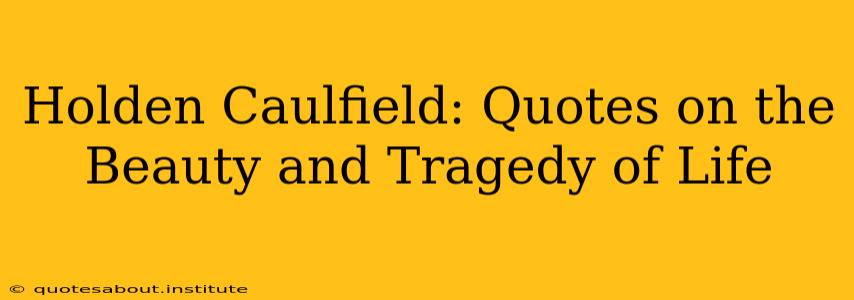Holden Caulfield, the iconic and deeply troubled protagonist of J.D. Salinger's The Catcher in the Rye, remains a captivating figure decades after the novel's publication. His cynical observations, tinged with a profound sadness and longing for authenticity, resonate with readers who see in him a reflection of their own struggles with adolescence, societal hypocrisy, and the complexities of the human condition. While Holden is often characterized by his negativity, a closer examination reveals a surprising sensitivity to the beauty and tragedy inherent in life, expressed subtly through his poignant quotes. This exploration delves into some of his most memorable lines, analyzing their underlying meaning and revealing the multifaceted nature of his worldview.
What are some of Holden Caulfield's most famous quotes?
This is a common question, and the answer depends on what aspects of Holden's character you want to highlight. Some of his most famous quotes highlight his alienation and disgust with the "phony" world around him, like "I'm quite illiterate, but I read a lot." This seemingly contradictory statement reveals his intellectual disconnect from the formal education system while acknowledging his voracious reading habits. Other popular quotes express his deep longing for connection and innocence, such as his repeated desire to "catch" children before they fall from a cliff of innocence. This is a powerful metaphor for his idealized view of childhood and his rejection of the perceived corruption of adulthood.
What does Holden Caulfield mean by "phony"?
Holden's frequent use of the word "phony" is arguably the most defining aspect of his vocabulary and worldview. It encapsulates his profound disillusionment with the superficiality and hypocrisy he perceives in the adults and even some of his peers. To Holden, "phony" isn't simply insincere; it represents a lack of genuine connection, a betrayal of authenticity, and a prioritizing of social appearances over genuine human interaction. He sees "phoniness" in everything from the affected manners of his teachers to the shallow conversations of his classmates. This disgust stems from his own vulnerability and his desperate search for genuine human connection in a world he finds fundamentally dishonest.
Is Holden Caulfield a reliable narrator?
This is a crucial question when analyzing The Catcher in the Rye. Holden's unreliability as a narrator is central to the novel's impact. He is recounting his experiences from a position of emotional turmoil and instability, coloring his perceptions with his own biases and anxieties. His memories are fragmented, his judgments are often harsh and unforgiving, and his emotional state significantly influences how he presents events. Understanding his unreliability is essential to interpreting the meaning behind his quotes and the overall narrative. We should not take everything he says at face value.
What is the significance of Holden Caulfield's desire to be the "catcher in the rye"?
Holden's recurring fantasy of being the "catcher in the rye" is a powerful symbol of his yearning to protect innocence and prevent the fall into adulthood. He envisions himself standing on a cliff, catching children who are about to fall over the edge, representing the loss of innocence and the corruption of the adult world. This metaphor reveals his deep-seated idealism, his fear of the complexities of adulthood, and his profound empathy for the vulnerabilities of childhood. It's a poignant expression of his desire to preserve something beautiful and pure in a world he finds increasingly disappointing.
How does Holden Caulfield's cynicism mask his sensitivity?
Holden's cynicism is, paradoxically, a defense mechanism concealing his profound sensitivity and vulnerability. His harsh judgments and sarcastic remarks serve as a shield against the pain and disappointment he experiences in his interactions with others. Beneath the surface of his anger and frustration lies a deep-seated longing for genuine connection, love, and understanding. His sensitivity is evident in his genuine affection for certain characters and his heartfelt moments of reflection, showcasing the complexity and contradictions within his personality.
Conclusion:
Holden Caulfield's quotes, though often cynical and pessimistic, offer a powerful and enduring insight into the complexities of the human experience. His observations about the "phony" world, his longing for innocence, and his desire to protect the vulnerable reveal a deep sensitivity masked by his emotional turmoil. By understanding the nuances of his perspective and acknowledging his unreliability as a narrator, we can appreciate the lasting significance of his words and the enduring relevance of his struggle to find meaning and authenticity in a world he perceives as deeply flawed. The beauty and tragedy of life, as seen through Holden's eyes, is a poignant reminder of the bittersweet journey of adolescence and the enduring search for meaning and connection.

